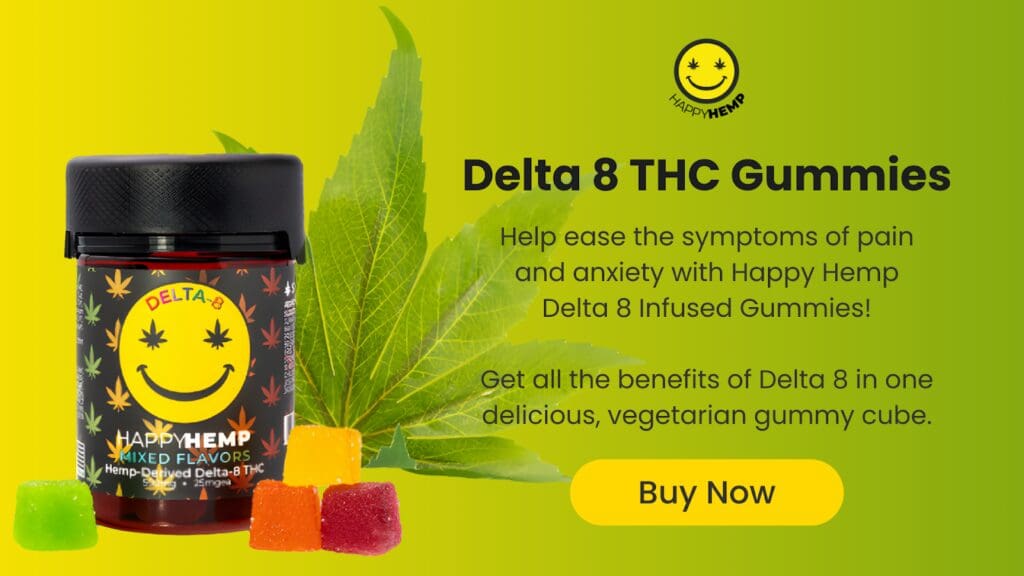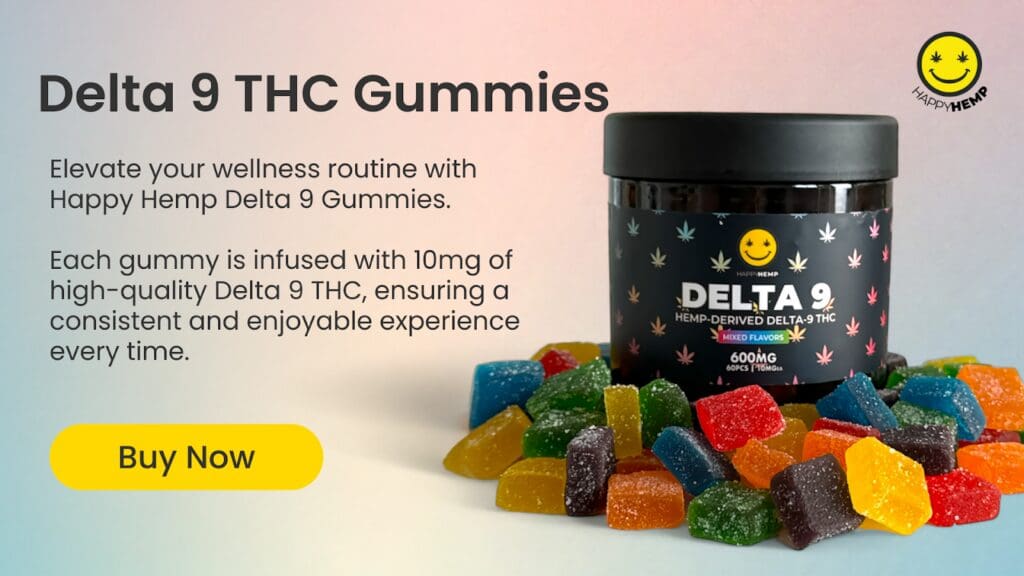Key Takeaways:
- Legal Status of Delta 8: Delta 8 is restricted for sale in Massachusetts due to state guidance from the Massachusetts Department of Agricultural Resources (MDAR).
- Federal Influence: Federal laws and potential regulatory changes could impact the future legal status of Delta 8 in Massachusetts.
- Caution for Consumers: Consumers should be aware of the legal gray area and quality concerns when purchasing Delta 8 products within the state.
With the growing popularity of Delta 8 products, consumers are eager to know where this unique cannabinoid stands in terms of legality across various states, especially Massachusetts. Delta 8 THC offers a distinct experience compared to Delta 9 THC, and understanding its legal status can help consumers make informed choices about where, how, and if they can purchase it.
With years of expertise in crafting premium, compliant hemp-derived products, Happy Hemp is committed to providing accurate and up-to-date information to help you navigate the laws surrounding Delta 8 THC. Our commitment to quality and transparency means you can count on us to bring clarity to complex topics like legality, so you can enjoy Delta 8 with confidence.
In this article, we’ll take a closer look at what Delta 8 THC is, the federal and state laws that impact its legality, and, most importantly, whether it is legally accessible in Massachusetts.
Understanding Delta 8 And Its Effects
Delta 8 THC, or Delta-8-tetrahydrocannabinol, is a naturally occurring cannabinoid found in both hemp and cannabis plants, though in smaller quantities than its more famous counterpart, Delta 9 THC. Known for its psychoactive properties, Delta 8 offers a similar but milder experience, often described as calming and clear-headed. Many users find its effects smoother and less intense, without the anxiety or paranoia that can sometimes accompany higher doses of Delta 9.
This milder effect is one of the reasons Delta 8 has become popular, especially among those seeking the benefits of THC without a strong “high.” It’s important to note, though, that Delta 8 still affects the brain and body similarly to other forms of THC, binding to receptors in the endocannabinoid system. As a result, it can produce positive effects but may also lead to mild side effects like dry mouth, fatigue, or lightheadedness in some users.
For those interested in experiencing the balanced effects of Delta 8 in an enjoyable and easy-to-manage form, Delta 8 gummies are a great choice. Happy Hemp’s Delta 8 Gummies offer a convenient, flavorful way to enjoy this milder THC experience, allowing you to feel the calming benefits without the overwhelming intensity. Try them today to see why Delta 8 has become a popular choice among THC enthusiasts!
Federal Laws Surrounding Delta 8
Delta 8’s legal status in the United States is complex and primarily influenced by the 2018 Farm Bill, which legalized hemp and its derivatives under certain conditions. Here’s a closer look at the key points of federal laws surrounding Delta 8:
2018 Farm Bill
This legislation legalized hemp and its derivatives, including CBD, across the United States. The bill stipulates that for any hemp product to be legal, it must contain no more than 0.3% Delta 9 THC by dry weight. Since Delta 8 can be derived from hemp, some producers use this law to legally manufacture and sell Delta 8, though its status remains debatable.
DEA Interim Rule
In 2020, the DEA issued an interim rule stating that all “synthetically derived” THC compounds remain federally illegal. Delta 8, when converted from CBD in a lab setting, could be classified as a synthetic THC, putting it at odds with federal regulations. This rule creates uncertainty for Delta 8 producers and consumers, as it is unclear whether the DEA will enforce this interpretation.
State Overrides
The Farm Bill allows individual states to establish their own regulations regarding hemp-derived cannabinoids, including Delta 8 THC. Some states have chosen to ban or restrict Delta 8, viewing it as similar to Delta 9 in terms of its psychoactive effects. As a result, Delta 8’s legal status varies widely across the U.S., with some states allowing its sale and others outlawing it entirely.
Is Delta 8 Legal In Massachusetts?
In Massachusetts, the legal status of Delta 8 THC is somewhat restrictive compared to other states. Although the state has legalized both medical and recreational marijuana, Delta 8 faces different regulations. The Massachusetts Cannabis Control Commission (CCC), which oversees cannabis regulation in the state, has clarified that Delta 8 THC is not approved for use in the same way as other cannabis products.
Massachusetts does allow the sale of CBD and other non-intoxicating hemp derivatives under certain conditions, provided they are derived from industrial hemp. However, the state has specifically limited the sale of Delta 8 products. The CCC has raised concerns about the lack of regulation and potential safety issues with unregulated Delta 8 production, especially because much of the Delta 8 on the market is synthesized from CBD rather than extracted directly from cannabis plants.
As a result, while Delta 8 is not explicitly banned under Massachusetts law, it is not legally available for recreational sale in the state’s cannabis dispensaries. This leaves consumers in a complicated position, as Delta 8 products sourced from out-of-state vendors might still be accessible online, though their legality remains questionable.
Massachusetts State Laws On Hemp And Cannabis Products
Massachusetts has specific regulations for hemp and cannabis products that impact the availability and legality of Delta 8 THC. Here’s a closer look at how these laws play a role:
Hemp Legalization
In Massachusetts, hemp cultivation and the sale of hemp-derived products were legalized in 2018, following the guidelines of the federal Farm Bill. This law permits licensed growers and processors to produce and sell hemp products as long as they contain less than 0.3% Delta 9 THC. However, Delta 8 was not widely known or addressed in these initial regulations, leading to confusion about its legal standing within the state.
Restrictions On Delta 8
In 2021, the Massachusetts Department of Agricultural Resources (MDAR) clarified that Delta 8 THC, even when derived from hemp, is not allowed for commercial sale within the state. This decision reflects caution around cannabinoids that produce psychoactive effects, especially since Delta 8 is often synthesized from CBD. The MDAR’s stance effectively bans Delta 8 products from legal dispensaries, stores, and online vendors operating within Massachusetts.
Adult-Use Cannabis Laws
Massachusetts has legalized recreational cannabis for adults over 21, allowing them to purchase and possess products with Delta 9 THC through state-regulated dispensaries. However, dispensaries are restricted from selling Delta 8 products because they do not fall under the approved list of cannabinoids under Massachusetts cannabis laws. Thus, while Delta 9 THC products are widely available at dispensaries, Delta 8 products are excluded due to current state policies and regulatory guidelines.
CBD And Other Cannabinoid Products
CBD products and other non-psychoactive cannabinoids derived from hemp are legal and readily available in Massachusetts. These products are sold in stores, wellness shops, and online, but must strictly exclude Delta 8 and any other psychoactive cannabinoids not specifically authorized. This careful separation of non-psychoactive and psychoactive hemp products demonstrates the state’s cautious approach to regulating the industry.
Where To Buy Delta 8 In Massachusetts
Because Delta 8 is not permitted for sale in Massachusetts, finding it in physical stores within the state can be challenging. Here’s an overview of the options and limitations for purchasing Delta 8 in Massachusetts:
- Local Retailers: Due to the Massachusetts Department of Agricultural Resources (MDAR) prohibition on Delta 8 products, licensed dispensaries and smoke shops in the state do not legally carry Delta 8. Consumers may come across unlicensed vendors offering Delta 8, but purchasing from these sources is risky and not recommended, as they may not follow safety or quality standards.
- Online Retailers: Some residents choose to buy Delta 8 products online. Although certain websites still ship Delta 8 to Massachusetts, it’s important to note that this is technically against state regulations. Additionally, online purchases can pose risks regarding product quality and purity, as unregulated items may not undergo the same level of testing as state-licensed cannabis products.
- Neighboring States: Some Massachusetts residents consider traveling to neighboring states with less restrictive Delta 8 laws to purchase products. However, transporting Delta 8 back into Massachusetts may still be technically against state guidance, making this a legally ambiguous option.
Future Of Delta 8 Legislation In Massachusetts
The legal landscape for Delta 8 in Massachusetts, as in many states, is evolving as lawmakers and regulators respond to the compound’s growing popularity. Here are some factors that could influence the future of Delta 8 legislation in the state:
Potential For Regulatory Updates
With the Massachusetts Department of Agricultural Resources (MDAR) issuing guidance to restrict Delta 8, it’s clear that the state is cautious about new cannabinoids with psychoactive effects. However, as public interest in Delta 8 grows, there may be calls for clearer, more inclusive regulations that address Delta 8 directly. This could lead to legislative updates or amendments to existing cannabis laws to either permit or further restrict Delta 8.
Public Health And Safety Concerns
State health and safety agencies may push for stricter regulations on Delta 8 due to concerns about product quality, especially since many Delta 8 products are derived synthetically from CBD. If data emerges linking Delta 8 to health risks, it could prompt lawmakers to consider further restrictions or mandatory testing requirements, similar to those applied to Delta 9 THC products in licensed dispensaries.
Influence Of Federal Regulation
If the federal government provides clearer guidelines on Delta 8, Massachusetts may adjust its own stance accordingly. A potential federal ban or stricter classification could lead Massachusetts to align its laws with federal standards, as is often the case with controlled substances. Conversely, if federal agencies decide to allow or regulate Delta 8, the state may follow suit by implementing similar guidelines.
Advocacy And Industry Influence
As the cannabis industry expands, advocacy groups may lobby for clearer Delta 8 legislation, arguing for consumer access and safe, regulated products. Public opinion and lobbying efforts from the cannabis industry may lead to more refined legislation that allows for the controlled sale of Delta 8 products.
Final Thoughts
The legality of Delta 8 THC in Massachusetts is complex, reflecting a broader debate about cannabinoids in the United States. While Delta 8 offers a unique experience with its milder psychoactive effects, the state’s regulatory bodies have yet to approve its sale in licensed dispensaries. Massachusetts’ cautious approach underscores the ongoing need for safety, quality control, and legal clarity around products like Delta 8.
For consumers, this means that while Delta 8 might be accessible through online sources, it comes with potential legal and safety concerns. Staying informed and adhering to Massachusetts state regulations is crucial, especially as the state may revisit and update its stance on Delta 8 in the future.
As research continues and the demand for alternative cannabinoids grows, it’s possible we’ll see new developments in both federal and state policies. Until then, Massachusetts residents are encouraged to explore legal, regulated cannabis options available within the state’s dispensaries, where they can rely on stringent quality standards.
Read also:
- Understanding The Difference Between CBD And Delta 8
- THC Edible Dosage Guide: How Much Should You Take?
- Delta 8 THC Flower: What You Need To Know
Frequently Asked Questions About Delta 8 Legality In Massachusetts
What is the difference between Delta 8 and Delta 9 THC in terms of legality?
Delta 9 THC is tightly regulated and legal only under certain conditions, while Delta 8 THC is not explicitly addressed in federal law but is restricted for sale in Massachusetts.
Can I travel with Delta 8 THC in Massachusetts?
Traveling with Delta 8 in Massachusetts can be risky, as the state prohibits the sale of Delta 8. Personal possession may not lead to penalties, but this could vary depending on law enforcement interpretation.
Are Delta 8 products safe to use if purchased online?
Delta 8 products from reputable brands with third-party lab testing are generally safer, but unregulated products can carry risks related to purity and potency.
Can medical marijuana patients in Massachusetts access Delta 8?
No, medical dispensaries in Massachusetts only carry Delta 9 THC products and do not offer Delta 8 THC due to state restrictions.
Is Delta 8 considered a controlled substance in Massachusetts?
Delta 8 is not classified as a controlled substance in Massachusetts but is restricted for sale according to the Massachusetts Department of Agricultural Resources.
What are the penalties for selling Delta 8 THC in Massachusetts?
Selling Delta 8 THC can result in fines and penalties, especially for unlicensed vendors who risk enforcement action from the state.
Can Delta 8 be legally shipped to Massachusetts from other states?
While some companies may ship Delta 8 to Massachusetts, doing so is technically against state regulations, and consumers should verify the legality and safety of these products.
Are there any exceptions for Delta 8 use under Massachusetts cannabis laws?
Currently, no exceptions are made for Delta 8 under Massachusetts cannabis laws; only Delta 9 THC products are available through licensed dispensaries.
Is it legal to possess Delta 8 purchased outside Massachusetts?
While possession of small amounts may not lead to penalties, it’s a gray area legally since Massachusetts restricts Delta 8’s sale within the state.
Are there any pending bills in Massachusetts to legalize Delta 8?
As of now, there are no specific bills in Massachusetts focused on Delta 8 legalization, though future cannabis legislation could potentially address it.
Sources:
- Leas, E. C. (2021). The hemp loophole: a need to clarify the legality of delta-8-THC and other hemp-derived tetrahydrocannabinol compounds. American Journal of Public Health, 111(11), 1927-1931.
- Leas, E. C., Nobles, A. L., Shi, Y., & Hendrickson, E. (2022). Public interest in∆ 8-Tetrahydrocannabinol (delta-8-THC) increased in US states that restricted∆ 9-Tetrahydrocannabinol (delta-9-THC) use. International Journal of Drug Policy, 101, 103557.
- Agriculture Improvement Act of 2018, H.R. 2, 115th Cong. (2018). https://www.congress.gov/bill/115th-congress/house-bill/2









